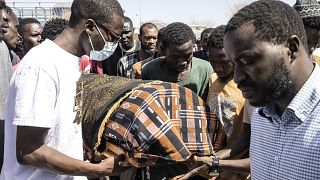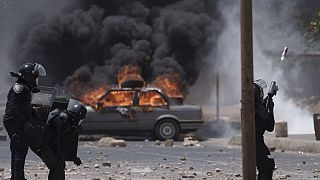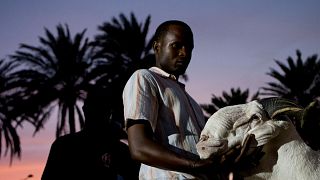Senegal
Unrest in Senegal is having a ricochet effect on the country's sheep herders ahead of the Muslim holiday, Aid-al-adha, one of two times of the year herders make the most profit.
For months, they have been gearing up for the holiday also known as Tabaski, when Muslims traditionally sacrifice a sheep for a family feast.
Cheick Ba is among many herders who have stayed back, too afraid of entering the Senegalese capital, Dakar.
"We left Mauritania with hundreds of sheep to come and sell them in Senegal, but when we arrived, we lost more than a hundred. We transported them in a lorry. They died of hunger and thirst because the distance was long, the roads weren't good and, above all, we didn't want to make a stopover to feed the cattle because we'd heard that there were violent demonstrations in Senegal. We were afraid of stopping and running into demonstrators who might seize the cattle, which is why the sheep couldn't rest or feed," deplores Mr. Cheikh Ba.
Authorities estimate billions of CFA in losses, as only 42 000 sheep have made it to the capital so far.
Ismaila Sow, an official with the national sheep breeders' association, says some herders were attacked in Keur Massar, east of Dakar, prompting the association to encourage farmers to stay clear of major cities.
"We have told livestock farmers and operators to stay in the waiting areas, in certain villages, and to avoid entering the big towns. Because if they go to the big towns in this tense situation with their livestock, the demonstrators can take it over. Shops can be closed, businesses can be protected, but farmers have no choice, they can't move around with their sheep," explained Mr. Sow, President of the National Council of the Senegalese Breeders' Association.
Sixteen people died in the three-day unrest, according to local authorities, while Amnesty International puts the toll at 23.
The opposition is planning a new unauthorised demonstration in Dakar on Sunday.
Shortfall
The secretary general of the livestock ministry, Ousmane Mbaye, told AFP that there was a "deficit" of sheep for Dakar as the festival loomed.
Herders are reluctant to bring sheep to Dakar both because of the unrest but also a decline in neighbourhood locations where live animals are sold, the authorities say.
Many such spaces have been turned to public parks or are construction sites.
The government keeps a very close eye on sheep numbers as Tabaski approaches.
Its census says, quite precisely, that Senegal currently has 559,215 animals, more than 18,000 more than this time last year.
The shortfall has caused prices to surge, leading to a wave of grumbling and official promises to "progressively reduce the gap" before festival day.
Amina Diallo, 62, said she paid 165,000 CFA francs ($280) for a sheep last year.
"This year, people are talking about a price of 200,000 francs. I told my son not to bother buying one if need be," she said.
In the city's rundown district of Grand-Medine, retired teacher Malick Coumba Ndiaye, 80, said he had paid 240,000 francs for a sheep imported from Mali.
"I had no choice. There aren't enough," he said.












01:04
Senegal ditches Akon's 'unrealistic' city project
01:00
Pix of the Day: July 3, 2025
01:06
China, Senegal pledge stronger strategic partnership during Beijing talks
01:39
Family of Kenyan man shot at close range by police demands accountability
Go to video
Protesters gather in Ivory Coast, demand Thiam's return on electoral list
01:43
TikTok star Khaby Lame plays soccer in Brazil after US detention